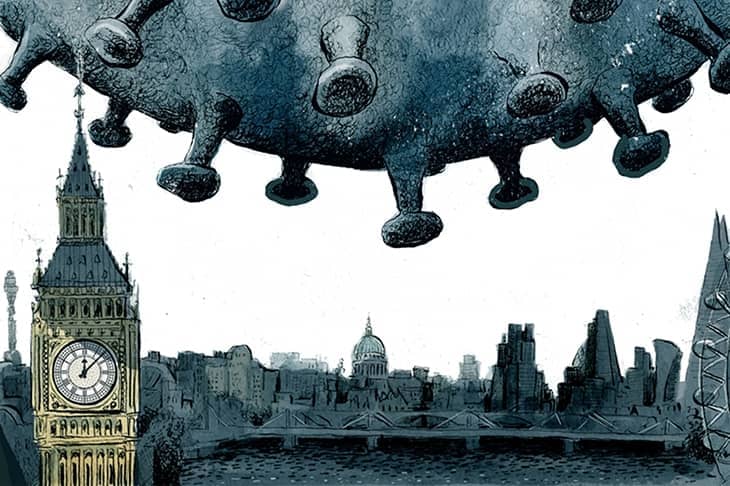For some it was the taped-off park benches, or the sight of police officers handing out fixed penalty notices to sunbathers. For others it was the sheer numbers of deaths being reported in inner boroughs. London in the spring of 2020 was definitely not the place to be. As with other world cities, it faced what seemed an existential crisis. The streets quickly drained of people, and those who could fled to second homes in the country.
The voracity with which Covid-19 spread sparked a fear of living at high densities. Pundits in Britain and America quickly proclaimed the death of cities. The belief was that remote-working had freed people from the constraint of living close to the office and they would now opt for quieter lives in smaller towns and suburbs. The US satirical magazine the Onion caught the mood, depicting a depopulated Manhattan suddenly colonised by hordes of northern white rhino.
Yet two years later, cities are back – faster than many thought possible, and few more so than London. The Pret Index, a proxy London foot-traffic measurement based on transactions at the sandwich chain across the city, has even surpassed its pre-Covid baseline in the West End. Restaurant reservations on OpenTable are at 89 per cent of pre–pandemic levels. In January, house prices in the capital grew at their fastest rate since 2016, and rents are back to where they were before Covid. Estate agents report large numbers of clients who fled London now seeking to return.

Why did anyone think it would be any different? Before the pandemic London had a claim to be the most desirable city on Earth, judging by the sheer numbers of people from all over the world who wanted to live there. Why should Covid-19 destroy that when more virulent plagues had failed to kill off the capital in the past?
In 1665, some 100,000 Londoners died from the plague. A year later, the Great Fire destroyed 87 churches, most of the City’s civic buildings and 13,000 houses. Yet reconstruction began almost immediately, and its new, grander, stone-built streets became an inspiration for the later rebuilding of Paris. London rebuilt again after the devastation of the Blitz, and it recovered from the ravages of deindustrialisation in the 1970s and 1980s. And it rebounded despite predictions of its eclipse as a global financial centre after the 2008 economic crash.
The same is true of all great cities: at some point, they have survived a cataclysmic event. Venice, Florence and Rome suffered outbreaks of bubonic plague which killed as much as half their population – yet young people flocked back to take advantage of higher wages and greater employment opportunities. Tokyo was devastated by an earthquake in 1923 and by incendiary bombs in 1945 which killed as many as 100,000 in one night. Both times, the city was back on its feet within a decade.
In place of a monoculture of offices, we’re likely to see more balanced places for living and socialising
Covid has changed one thing about London, however. Office occupancy remains less than half of what it was before the pandemic. With remote-working expected to take up at least one in five working days even after the pandemic is over, the commercial heart of the city is going to feel very different.
But a city is not reducible to its offices. Great cities are adaptive: they remake and reuse their buildings and built environment as circumstances change. When deindustrialisation set in, buildings that had been factories became artists’ lofts and galleries, and later luxury residences and offices for hi-tech companies. Once-forlorn industrial districts were remade as hubs of the growing knowledge and creative economies.
The packing and stacking of workers in vertical office towers is the last vestige of the old industrial age. It doesn’t reflect the realities of the kind of work that is being done today, nor the purpose of the city, which is more social than utilitarian. In place of a monoculture of offices, with empty desks after 8 p.m., we are likely to see the City and other districts reborn as more balanced places, with people living and socialising.
I saw this transformation last summer in New York City as it began to reopen. Midtown’s office towers were still mostly abandoned. But the very same knowledge workers not in their offices were lining up in front of midtown restaurants and bars at the end of the working day. They had come into the neighbourhood to socialise with their peers. The growth of urban economies is driven more by connecting people to one another than by office work per se. It is these connections that spur new ideas, new businesses and new industries that ultimately lead to improved productivity, greater wealth and better living standards.
The pandemic accelerated changes which were already under way in cities. Even before Covid, urban office districts were adding residences, hotels, restaurants and fitness facilities. After 9/11, New York’s financial district was remade as a live-work area with much more residential accommodation and amenities. The same has been happening in London’s business centres such as Canary Wharf, and the City has been expanding into adjacent, more mixed-use communities, such as King’s Cross, Shoreditch and London Bridge, for some time.
The city itself is transforming into an extended version of the office, as more work takes place in cafés, bars and hotel lobbies. London has been at the forefront of this shift, incubating an array of co-working spaces. It’s not a new phenomenon, but a return to an old one: the London Stock Exchange began in Jonathan’s Coffee House in 1698; Lloyd’s of London began in Lloyd’s Coffee House on Lombard Street around the same time.
Even if workers do not come to the office five days a week, they will still spend time in the city to meet, share ideas and do business. That’s ultimately why London and other great cities will survive and thrive. All roads lead to them.






Comments